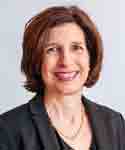 As COVID-19 suddenly interrupted most in-person activities this spring, interactive rheumatology education has flourished online, thanks to the new Virtual Rheumatology Learning Collaborative (ViRL). The eight-week program of 23 virtual didactic sessions streamed at 9 a.m. CST every Monday, Wednesday and Friday April 6–May 29, using Zoom interactive meeting software and hosted live on RingCentral through the ACR.
As COVID-19 suddenly interrupted most in-person activities this spring, interactive rheumatology education has flourished online, thanks to the new Virtual Rheumatology Learning Collaborative (ViRL). The eight-week program of 23 virtual didactic sessions streamed at 9 a.m. CST every Monday, Wednesday and Friday April 6–May 29, using Zoom interactive meeting software and hosted live on RingCentral through the ACR.
The new program’s name was meant to evoke the current coronavirus pandemic, says its creator, Anisha Bharadwaj Dua, MD, MPH, associate professor of medicine at Northwestern University Feinberg School of Medicine, Chicago. Within days of its launch the first week of April, ViRL actually went viral, attracting more than 1,200 registered participants from 143 institutions and 20 countries. Dr. Dua was also ViRL’s first speaker, presenting a lecture on therapeutic updates in anti-neutrophil cytoplasmic antibodies (ANCA) vasculitis on April 6. Sessions consistently attracted an average of 450 registered participants.
“The pandemic and physical distancing put a halt to our regular didactic program for rheumatology fellows, which is usually delivered through in-person discussions. We didn’t want to sacrifice the quality of education to our fellows,” she says. When one of her fellows, Sarah Fantus, told her about an online learning collaborative for urology with lectures from different institutions on one platform, Dr. Dua contacted program directors at other institutions, including Beth L. Jonas, MD, FACR, Reeves Foundation Distinguished Professor of Medicine, University of North Carolina, Chapel Hill, and chair of the ACR Committee on Rheumatology Training and Workforce Issues, to create a similar program in rheumatology—and 24 responded with offers to pool resources and provide speakers.
ViRL was launched within a week, with the ACR providing technical support. “It is amazing how quickly things can happen in a crisis,” says Dr. Dua.
Enriching Curriculum
One of the first speakers to join the ViRL faculty was Marcy B. Bolster, MD, director of the Rheumatology Fellowship Training Program at the Massachusetts General Hospital, Boston. She had worked with Dr. Dua on fellows’ education projects before, and she immediately agreed to deliver a lecture on May 8 called Osteoporosis: Treatment, Duration and Holidays.
“It is important, as a rheumatology program director, that we maintain fellows’ education in their chosen specialty,” and offer rheumatology education at a very high level, says Dr. Bolster.
In the spring, Dr. Bolster began serving on hospital rotations to treat COVID-19 patients or was at home providing care to patients through telemedicine. Many rheumatologists were suddenly unavailable to educate fellows in the clinic setting, she says. “With the ViRL lecture series, we can fill the gaps on so many levels. This lecture series provides an opportunity to connect when we are all working remotely. Sustained educational programming is a challenge, but this curriculum is very enriching. It’s new, innovative and fills gaps, and the topics cross a broad spectrum of rheumatology.”




